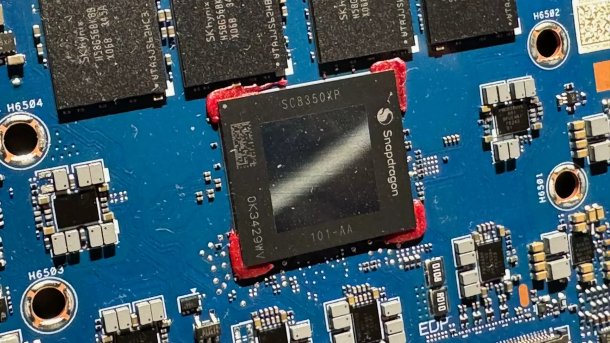ARM torpedoes Windows on ARM: Demands destruction of all PCs with Snapdragon X
It just seems too abstruse: ARM could become relevant for PCs for the first time. However, the company itself is torpedoing the venture.

Qualcomm's Snapdragon X processor shown here is a thorn in ARM's side because the company wants more license fees.
(Image: c't / mue)
ARM and Qualcomm have still not settled their license dispute after almost two years. The fronts have hardened to such an extent that Qualcomm recently filed a counterclaim against ARM and ARM wants to stop selling all PCs with Snapdragon X processors.
The reason for this is Qualcomm's acquisition of the start-up Nuvia, which developed its own ARM core in 2019 under the leadership of former Apple engineers. Nuvia actually wanted to use this core in server processors and has acquired an ARM license for this purpose.
However, Qualcomm has repurposed this core as the "Oryon" for the Snapdragon X Elite and Snapdragon X Plus PC processors and presumably also wants to use it in systems-on-chip (SoCs) for smartphones in the future. ARM argues that the existing license agreements would not cover the use of a custom core.
Videos by heise
ARM demands destruction of all Snapdragon X CPUs
In an August 2022 lawsuit filed in the US District Court of Delaware (case number 1:22-cv-01146), ARM stated:
"Qualcomm caused Nuvia to breach its ARM licenses, leading ARM to terminate those licenses, in turn requiring Qualcomm and Nuvia to stop using and destroy any ARM-based technology developed under the licenses."
In a statement to Reuters, ARM insists:
"ARM's claim against Qualcomm and Nuvia is about protecting the ARM ecosystem and partners who rely on our IP and innovative designs, and therefore enforcing Qualcomm's contractual obligation to destroy and stop using the Nuvia designs that were derived from ARM technology."
In plain language, this means that Acer, Asus, Dell, HP, Microsoft, Lenovo, Samsung and other smaller manufacturers should destroy all notebooks or mini PCs with Snapdragon X CPUs.
This may be the reason why Microsoft allegedly prefers to work with Mediatek and Nvidia rather than Qualcomm in the future.
Qualcomm counters with a counterclaim
Qualcomm filed a counterclaim against ARM on April 18, 2024, also in the US District Court of Delaware (case number 1:24-cv-00490). In it, the company collects all allegations against ARM from recent years. Some pearls from the statement of claim:
"In furtherance of this effort, ARM has attempted to stifle Qualcomm’s technological leaps in CPU design by intentionally withholding deliverables paid for and due to Qualcomm under Qualcomm’s ARM architecture license agreement (“ALA”), misrepresenting the existence of those deliverables when Qualcomm provided written notice of ARM’s failure to deliver, and threatening to terminate Qualcomm’s licenses if it attempted to enforce its contractual right to obtain the deliverables in question."
"Finally [...] ARM deliberately withheld deliverables to which Qualcomm is entitled under its ALA with ARM under the guise that Qualcomm’s ALA does not entitle Qualcomm to support for 'Nuvia-based technology'. ARM’s excuse is unjustified, and its breach could not be more clear."
"ARM never cured its failure to deliver, causing Qualcomm to expend additional, unnecessary resources in designing and verifying its products."
Apparently, ARM wants to push through a new licensing model to generate more revenue. The main aim is to base license costs on the price of the device rather than the processor. According to Qualcomm, this involves a one-off payment of several hundred million US dollars plus significantly higher license fees on an ongoing basis.
A troubled partnership
According to Reuters, the first day of negotiations between ARM and Qualcomm is not scheduled until December 2024. Anyone who wants to buy a PC with Snapdragon X Elite or Snapdragon X Plus has little to fear, at least immediately. A temporary sales stop seems unrealistic – rather, the threat is intended to increase the pressure on Qualcomm.
From an observer's perspective, the whole situation seems absurd. For years, ARM wanted to get its CPU instruction set into notebooks and desktop PCs. Now, for the first time, there is a realistic opportunity and ARM is torpedoing it to get a bigger slice of the pie. Qualcomm is also the second-largest supplier of smartphone processors (after Mediatek), making it one of ARM's most important partners.
Meanwhile, Qualcomm is dependent on ARM because the company cannot develop any processors without the CPU instruction set. This would actually be the perfect breeding ground for a symbiosis, but it has gone badly wrong.
(mma)